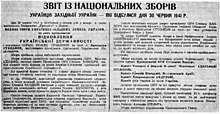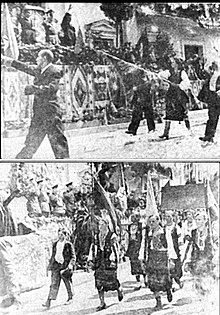
Back Akt obnovení Ukrajinského státu Czech Déclaration d'indépendance de l'Ukraine (1941) French Atto di restaurazione dello Stato ucraino Italian Akt odnowienia Państwa Ukraińskiego Polish Declarația de Independență a Ucrainei, 1941 Romanian Акт провозглашения Украинского государства (1941) Russian Акт відновлення Української Держави Ukrainian 乌克兰国家恢复法案 Chinese
This article has multiple issues. Please help improve it or discuss these issues on the talk page. (Learn how and when to remove these messages)
|

The act of restoration of the Ukrainian state (Ukrainian: Акт відновлення Української Держави) or proclamation of the Ukrainian state of June 30, 1941, was announced by the Organization of Ukrainian Nationalists (OUN) under the leadership of Stepan Bandera, who declared an independent Ukrainian state in Lviv. The self-proclaimed prime minister was Yaroslav Stetsko, and the head of the Council of Seniors was Kost Levytsky.
The OUN intended to take advantage of the retreat of Soviet forces from Ukraine during the German invasion of the Soviet Union that began on June 22. Their leaders thought that their movement had found a new powerful ally in Nazi Germany to aid them in their struggle against the Soviet Union. The Ukrainian nationalists began a series of pogroms against Jews, with many murdered and assaulted. Days after the German invasion and occupation of Lviv, however, the leadership of the newly formed government was arrested and sent to concentration camps in Germany.

